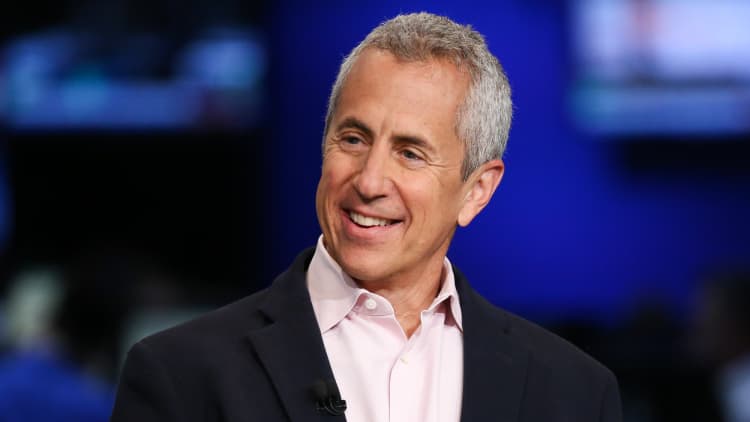For more than a decade, Tender Greens has been serving "fine casual" meals — think Chipotle on date night — to hungry, health-conscious crowds in California. Lines are typically out the door at 24 sunny locations, from San Diego to San Francisco. Now the company is hoping its West Coast vibe can thrive in the East, with an infusion of cash from the man behind Shake Shack.
New York City restaurateur Danny Meyer and his Union Square Hospitality Group took a minority stake in Tender Greens two years ago, and now they are taking action on a plan to double the restaurant concept's reach over the next three years, starting with openings in Manhattan and Boston this winter. The chain — which launched in Culver City, California, in 2006 — plans to bring its farm-to-fast-food-counter approach to customers from New England to D.C.
"We're replicating what we did successfully over the last 11 years but in a different climate and with a new customer base," said chef Erik Oberholtzer, who founded the company with fine-dining veterans David Dressler and Matt Lyman. Back then, the concept was a head-turner. At a time when fresh, chef-made lunches and dinners meant sitting over a white tablecloth, Tender Greens filled a void: You could now enjoy your steak or herb-encrusted tuna even while wearing flip-flops. Local beers are on tap. Meat is sliced at a carving station, though vegans do not leave disappointed.
Each location is run by its own chef and has a different menu. Customers order at a counter fronting an open kitchen and choose proteins such as roasted fish and slow-cooked shank with plentiful options to make bowls, sandwiches and salads. Eggs are free-range. By sourcing in volume from a network of California farms, the chain kept high-quality meal prices in the $10–$15 range, well below what fine-dining establishments next door was charging.
"Fine dining for the price of fast casual was an idea we could immediately get behind," said Josh Goldin, co-founder of Alliance Consumer Growth, which jointly invested in Tender Greens with Meyer's Union Square Hospitality Group. The company also bankrolled Shake Shack. "It's telling consumers you can have farm-fresh ingredients by chefs who worked in Michelin-star environments, but in a casual setting that won't break the bank."
Consumers ... can have farm-fresh ingredients by chefs who worked in Michelin-star environments, but in a casual setting that won't break the bank.Josh Goldinco-founder of Alliance Consumer Growth, investor in Tender Greens
Shake Shack's imprimatur is all over a recent Tender Greens rebranding. New York-based Pentagram, which designed the burger chain's identity, unveiled a new modern logo and look for Tender Greens just in time for the national expansion. "We're building a great supply chain of farms and suppliers from New England to DC so we can replicate what we've done in a way that makes most sense for the new locations," Goldin says. The first East Coast location is set to open on 19th Street and Broadway in Manhattan in January, followed by a location in Boston's Chestnut Hill area in March. Other openings in New York and Boston, along with DC and Philadelphia are in the works. "We believe this is food people everywhere in America will want and appreciate."
The challenges of going big
Going big has its challenges, starting with the state of the restaurant industry itself.
"Thirty percent of consumers have recently cut back on visiting restaurants, and fast food and fast casual both have slowed, something we haven't seen since the great recession," says Bonnie Riggs, food-service industry analyst at NPD Group, noting that fast and fresh competitors, including Lyfe Kitchen, have closed locations. Shake Shack is down more than 30 percent all-time since its IPO. "Tender Greens needs a lot of foot traffic and affluent customers, and right now the competition can't find enough bodies to fill those seats."
Tender Greens is sharpening its service game with new kitchen technology to speed the flow of orders, a snafu that's partly to blame for the sector stall. "We love that our customer lines spill out into the streets, but we know it's more important to process orders as quickly as possible," Oberholtz said. As with Shake Shack, Tender Greens is exploring mobile app ordering, online ordering and improved kitchen communication.

Menus will also change to reflect the best meats, fish and produce available from local distributors. Unlike competitors that have slowed, Tender Greens gives each chef and location freedom to customize menus to suit seasonal tastes and customer demands.
Oberholtzer says the freshness and freedom for chefs to improvise gives Tender Greens an opportunity to make each location a singular experience. "What we're delivering isn't fast food or food on an industrial scale. It's food that these great chefs would cook at home for their friends and family. The orders may come fast, but the mind-set is the opposite of fast food."
More from iCONIC:
A crazy late-night coffee soda experiment that landed at Whole Foods in less than a year
Following the California model, the East Coast locations will rely on a local network of growers and suppliers who get fresh ingredients to Tender Greens customers within 24 to 48 hours of picking. "This type of delivery system is unheard of in the fast-casual world, and it really sets us apart in terms of flavor and quality," Goldin said.
As part of its broader corporate mission, The Sustainable Life Project trains teens and young adults at risk for homelessness to become chefs and kitchen staff.
"Yes, we're going to play hard and play to win, but our first commitment is to improving the way we eat in America," Oberholtzer said. "You can serve fresh food that's prepared by great chefs and make it affordable, and there's still money to be made. What we've learned after a decade is, you don't have to let go of your principles and values to run a successful business."
— By David Hochman, special to CNBC.com




